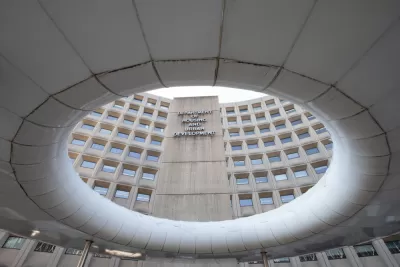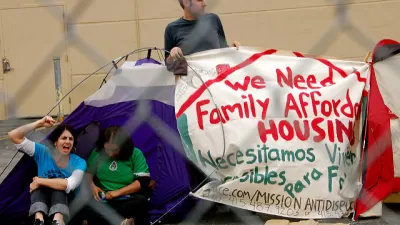The Trump administration last week published its latest attempt to undermine a fair housing rule adopted during the Obama administration.

The U.S. Department of Housing and Urban Development (HUD) recently published a proposed rule change that would weaken the Affirmatively Furthering Fair Housing adopted by HUD during the Obama administration in 2015.
Patrick Sisson reports the news of the long-promised rule changes publication, describing the purpose of the Affirmatively Furthering Fair Housing rule as a landmark effort to strengthen the ability of the Fair Housing Act of 1968 to prevent desegregation and discrimination in the housing market:
Obama’s measure required recipients of Community Development Block Grant money, a funding source used by over 1,300 municipalities across the nation, to engage in a formal review process to make sure new developments weren’t contributing to segregation, and then create their own fair housing goals. But it was never fully implemented before being blocked by the Trump administration, which is now aiming to issue its own rules.
Sisson's article includes numerous housing advocates expressing concern about the potential consequences of the Trump administration's proposal, if adopted.
Given the broadly sweeping implications of the proposed rule change, numerous media outlets have covered the news, like Katy O'Donnell providing news coverage for Politico and Lola Fadulu providing news coverage for the New York Times.
Fadulu's explains the rationale for the Trump administration's rule change thusly:
The Trump administration plans to propose a rule next week that will pull back those guidelines, arguing that they are onerous and actually holding back the construction of affordable housing. “Fair housing choice,” the new proposal says, is ensuring that people have the opportunity and option to live “where they choose” as long as there is no “unlawful discrimination.”
O'Donnell describes the rationale with the following:
The regulation as it stands is “too prescriptive in outcomes for jurisdictions,” HUD will say in the new rule, according to a copy of the proposal obtained by POLITICO.
“Since the issuance of the 2015 final rule, HUD has determined that the current regulations are overly burdensome to both HUD and grantees and are ineffective in helping program participants meet their reporting obligations,” the proposal states.
The revised rule would “alleviate the unintended consequences of discouraging the use of federal assistance in communities that need additional help instead of restrictions,” according to the proposal.
Both The Hill and The Washington Post both published opinion pieces opposing the rule changed proposed by the Trump Administration.
For more historical background on Affirmatively Furthering Fair Housing and the Trump administration's efforts to undermine the rule, see Planetizen's tag on the subject. Also note the importance of disparate impact, the legal doctrine upheld by the Supreme Court in 2015 that provides the foundation for Affirmatively Furthering Fair Housing. A previous rule change proposed by the Trump administration, published in August 2019, attempted to weaken disparate impact.
FULL STORY: New Trump rule could repeal Obama effort to promote housing desegregation

Alabama: Trump Terminates Settlements for Black Communities Harmed By Raw Sewage
Trump deemed the landmark civil rights agreement “illegal DEI and environmental justice policy.”

Study: Maui’s Plan to Convert Vacation Rentals to Long-Term Housing Could Cause Nearly $1 Billion Economic Loss
The plan would reduce visitor accommodation by 25% resulting in 1,900 jobs lost.

Why Should We Subsidize Public Transportation?
Many public transit agencies face financial stress due to rising costs, declining fare revenue, and declining subsidies. Transit advocates must provide a strong business case for increasing public transit funding.

Paris Bike Boom Leads to Steep Drop in Air Pollution
The French city’s air quality has improved dramatically in the past 20 years, coinciding with a growth in cycling.

Why Housing Costs More to Build in California Than in Texas
Hard costs like labor and materials combined with ‘soft’ costs such as permitting make building in the San Francisco Bay Area almost three times as costly as in Texas cities.

San Diego County Sees a Rise in Urban Coyotes
San Diego County experiences a rise in urban coyotes, as sightings become prevalent throughout its urban neighbourhoods and surrounding areas.
Urban Design for Planners 1: Software Tools
This six-course series explores essential urban design concepts using open source software and equips planners with the tools they need to participate fully in the urban design process.
Planning for Universal Design
Learn the tools for implementing Universal Design in planning regulations.
Smith Gee Studio
Alamo Area Metropolitan Planning Organization
City of Santa Clarita
Institute for Housing and Urban Development Studies (IHS)
City of Grandview
Harvard GSD Executive Education
Toledo-Lucas County Plan Commissions
Salt Lake City
NYU Wagner Graduate School of Public Service





























